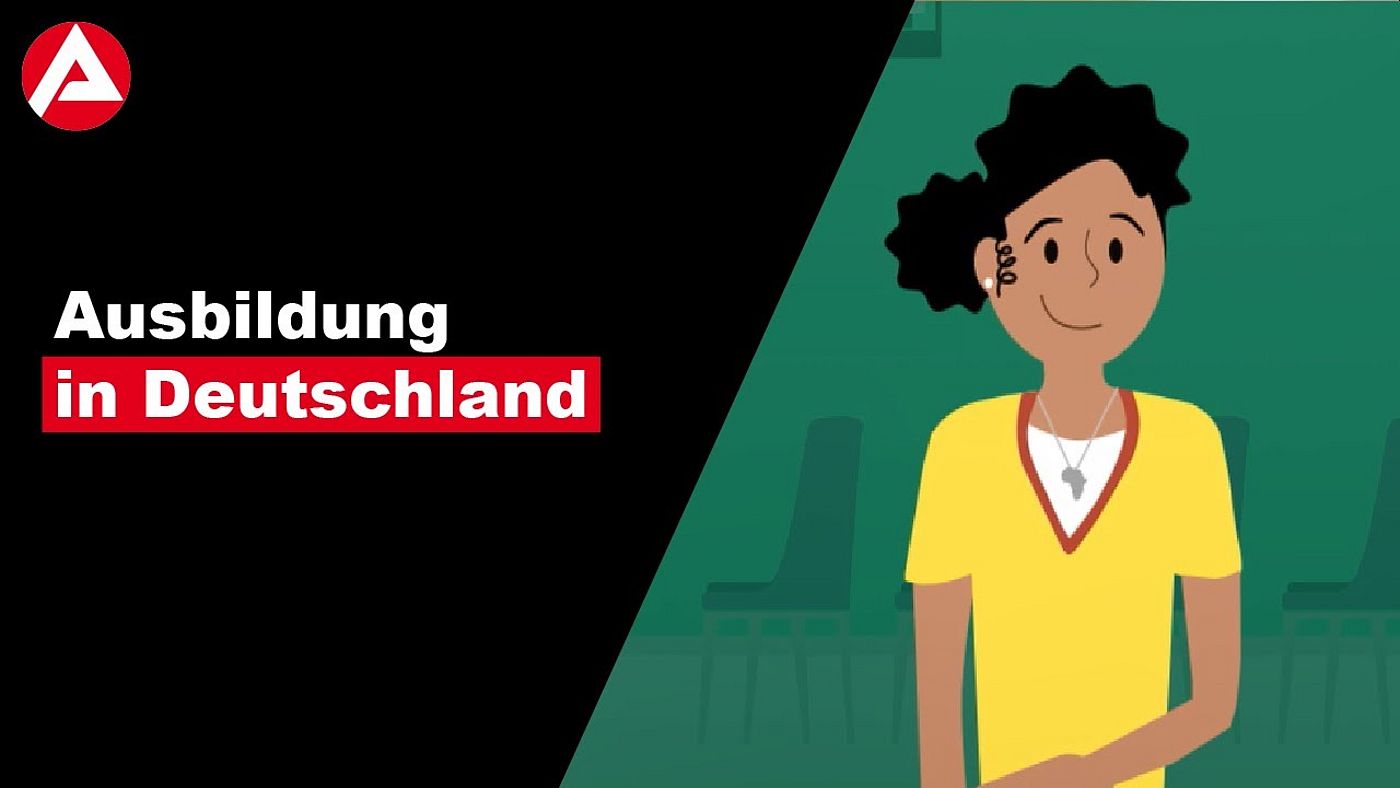Choosing the right vocational training is a decisive step for your professional future. But how do you find out which path suits you the best? What do you have to consider during your application in Germany? In this section, we will explain step by step how to apply successfully for vocational training in Germany.

How do I find vocational training?
In Germany, there are almost 350 dual vocational training occupations: here, you will find several tips on how to find the vocational training programme which suits your expectations and wishes.
Which vocational training is the most suitable for me?
The key is to know your interests and strengths. Think about what brings you joy: are you skilled in a craft, creative or like to work with people? Maybe you are enthusiastic about technology, natural sciences or commercial tasks? The more you know where your skills lie, the easier it is to find vocational training that suits you. You should therefore take your time to get to know the vocational training professions and find out what competencies are demanded respectively.
Many online portals help you in finding the right profession: free online assessments, such as the exploration tool Check-U of the Federal Employment Agency (BA), or portals like Planet-Beruf and Berufenavi offer initial orientation. Professional associations like the Deutsche Handwerkskammertag (DHKT) e. V. (Association of German Chambers of Crafts and Trades) support the search by offering a filter option in their search engine to find suitable positions according to your interests.
On the BERUFENET online platform, you will find detailed profession profiles intended for teaching you more about your desired profession, and on the YouTube channel “Berufsorientierung ” (professional orientation) of the Federal Institute for Vocational Education and Training (BIBB), as well as on the “BERUFE.TV ” film portal of the BA, you can learn more about numerous professional fields.
In our “vocational training profession in demand” section, you will additionally get an overview of vocational training programmes where there is currently a high demand for skilled workers in Germany.
Legal Requirements for Vocational Training
Visa, school diploma, and language skills: To be able to do vocational training in Germany, you need to meet certain requirements. We explain exactly what these are in the section: “Requirements for Vocational Training?”
Where do I find a vocational training position?
Searching for a vocational training position can be a challenge. Luckily, there are numerous free job boards in Germany which facilitate the searching process for you.
Job boards
- The platform of the Federal Employment Agency is one of the first pages to visit to find vacant vocational training positions: Here you will find a clearly structured search engine with options for filtering the results by sector, region and start of the vocational training, amongst other things.
- The Chamber of Industry and Commerce (IHK) has its own board for vocational training positions with about 116,000 available positions in industry and commerce. This engine allows you to enter your desired profession, region and even the company.
- The Lehrstellenradar of the Chamber of Crafts also offers such selection options tailored to profession in the field of crafts and trades.
Other tips for searching vocational training positions
Career networks, such as LinkedIn or XING are not only useful for experienced skilled workers, but apprentices can also find positions for vocational training there. Many companies publish vacant positions directly on their profiles. That is how you can establish connections with the HR representatives or look for vocational training positions in the area in a targeted manner. Beware for how you present yourself on these platforms. Your profile is often the first impression a company gains from you.
Via job fairs for professional orientation, you can also immediately get in contact with companies and institutions. You can inform yourself of offers for vocational training on site, ask questions and, oftentimes, even submit your application in person.
Searching for a vocational training position requires a lot of effort. Regardless of whether you are looking online via job boards and networks or in person at fairs and events, the more options you take advantage of, the higher your chances of finding the perfect vocational training position.
Tip: By searching for the term “Ausbildung” and the desired vocational training profession in online search engines, you will encounter local (private) job boards, which advertise current, job-specific positions.
In a nutshell: Vocational training in Germany

How do I apply for a vocational training position?
Did you find an interesting position? Let’s start with the application! In this context, it is important to present yourself in the best way, so that your chances of getting the desired vocational training position are as high as possible.
Language of the application
Before writing your application, inform yourself of whether it has to be in German or if English is accepted as well. If you have good German skills, do not be shy, write your application in German and have it proofread by a German native speaker. However, it is not advisable to keep up a pretense of having language skills by using AI, for example, because during the interview, at the latest, your true knowledge will be revealed. You can find more information on the topic in our “Do I need to know German?” section.
When do you have to apply?
The ideal time for the application depends on when the vocational training starts. Generally, the application periods for vocational training begin about a year in advance. It is worthwhile starting your research early, because many companies fill their vacancies early as well. As a rule, vocational training then starts in August or September every year. Inform yourself of the application deadlines and plan enough time for drawing up your documents. Consider that the application process can take up a lot of time: several months can pass from the moment you draw up your cover letter, recruitment tests or assessment centres, up until the interview.
How do you draw up a CV?
A clearly structured and professional CV is the central part of your application.
- Structure: state your personal information at the beginning of your CV, followed by your school education, your career path including internships and secondary jobs and specific skills (for example, language and software skills). In Germany, a picture and indications on your personal interests are welcomed, but they are not obligatory.
- Design: pay attention to a clear structure, a legible font, and a design which is pleasing to the eye. If need be, use templates to make sure your CV leaves a professional impression. Moreover, it should not be longer than two pages; ideally it is only one page long.
Tip: Europass offers a great template for drawing up a convincing CV!
What does a cover letter contain?
A good cover letter should be well structured and convincing. It starts with a personal form of address, ideally addressing the correct contact person within the company. In the introductory sentence, you should state your interest in the vocational training position and the company clearly.
In the main body, you explain your motivation for the vocational training programme, name any relevant experience from previous jobs, internships and projects and describe your strengths qualifying you for the position. Show why you are a good fit and how you plan on contributing to the company. This also includes your soft skills.
To conclude, you express thanks for the opportunity to submit your application and mention that you would be grateful to be invited for an in-person interview. Make sure to tailor your cover letter to the individual position, and avoid any errors. Read the advertisement for the vocational training carefully to consider any special requirements regarding your documents and to include any important key terms. For example, for creative vocational training professions, companies often ask for concrete samples of your work.
More tips and templates, as well as a check list for the cover letter, can be found online, for example on the website of the Federal Employment Agency (BA). In our “Application” section, you will also receive more tips on this topic.
What is the procedure during an interview?
Have you been invited for an interview? Congratulations! To leave a good impression, it is crucial to be well prepared. Make sure to gather thorough information on the company and the vocation training position to show that you are motivated and interested. Practice answering common questions, like “Why do you want to learn this profession?” or “What are your strengths and weaknesses?”, and also prepare questions for the company on your end. Dress appropriately and professionally and be on time.
In some cases, recruitment tests or an assessment centre might be part of the selection process. These are two common procedures to check the suitability of the applicant’s practical skills for vocational training or a job and their suitability for vocational training or a job position. Recruitment tests focus on vetting job-related special and cognitive skills, like general knowledge, maths or language skills. They help in evaluating the topic-specific competence of the candidates.
Assessment centres, however, put more focus on social skills, like team spirit and the ability to communicate and solve conflicts. This method is especially suited for observing one’s behaviour in group settings. Particularly on the occasion that assessment centres are conducted, it may be necessary for foreign applicants to travel to Germany. To prepare for both selection procedures, the platform Planet-Beruf.de offers helpful tips and interactive exercises. On the website, you will find material to prepare for recruitment tests and assessment centres.
A day of trial work is also not uncommon in Germany. By means of that, your employer can get to know you more and see how you apply your skills practically.
Good to know: The Planet-Beruf.de portal offers comprehensive information on the application procedure and preparation.
Where can I get further assistance?
Numerous institutions support you in finding your career path and searching for a vocational training position:
- Welcome Center: these points of contact can help you in finding your way around the German labour market, amongst other things. You can find an overview of the sites in your area here.
- Federal Employment Agency and chambers: the Federal Employment Agency (BA), as well as the local Chambers of Industry and Commerce (IHK) and Chambers of Crafts (HWK) have offers for individual counselling and placement.
- BIBB: the Federal Institute for Vocational Education and Training provides comprehensive information on vocational training.
- Migration counselling for adult immigrants (MBE): the MBE and their partners offer counselling on professional opportunities and questions on integration. You can find more information on the website of the Federal Office for Migration and Refugees (BAMF).
- “Working and Living in Germany“ hotline: the telephone counselling service of the Federal Office for Migration and Refugees (BAMF) and the Federal Employment Agency can help you with your questions.
Funding programmes and financial support
Aside from support in terms of content, there is also financial help which can facilitate the process of starting vocational training. Please note that you must be in Germany to benefit from most options for funding and that, in general, financing must be secured in advance. The requirements for the benefits are often very strict. Inform yourself of whether you are entitled to vocational training aid (Berufsausbildungshilfe; BAB for short) from the Federal Employment Agency (BA) or to housing benefit (Wohngeld).
In the „Placement agencies” section, you will get information on offers provided by the state or private placement agencies which can support you professionally during the entire placement process. On the world map, you will additionally find a selection of important point of contact preparing you for you arrival in Germany.
Information on the web
- Federal Ministry for Economic Affairs and Climate Action (BMWK) Info paper: The dual vocational training system in Germany
- Federal Employment Agency (BA) Tips for writing job applications
- Federal Institute for Vocational Education and Training (BIBB) Profiles of several occupations requiring vocational training
- Planet Beruf Find out which profession is best for you
- Youth migration services The advice portal for your life in Germany
Do you have any questions?
Let us advise you on your opportunities to work and live in Germany. Our experts will support you with questions regarding job search, visa, recognition and learning German.
You can find out more about the various contact options by clicking on one of the icons in the bar below.




